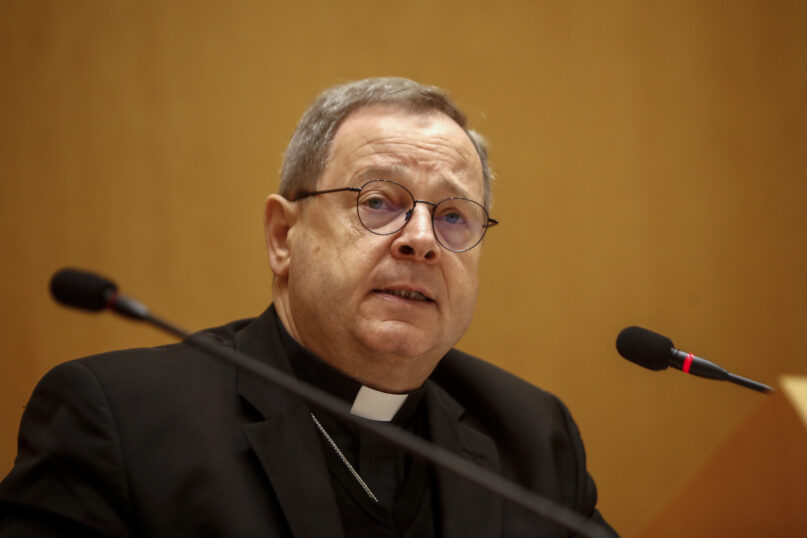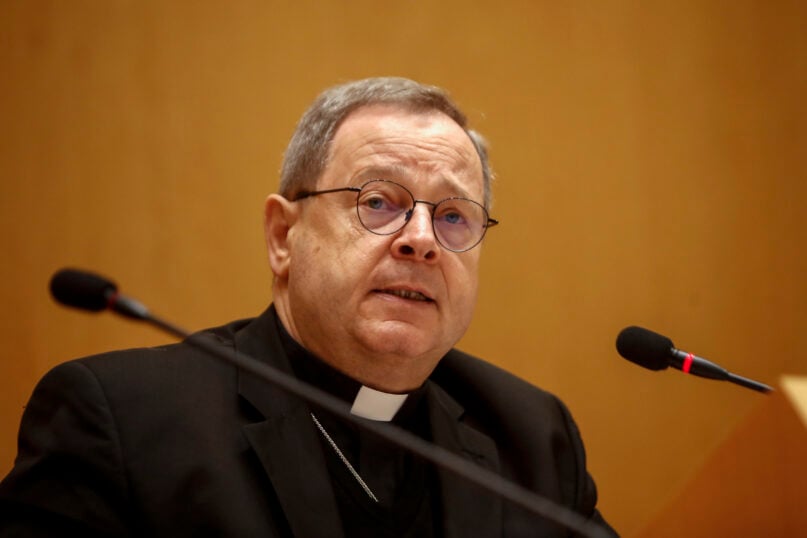
VATICAN CITY (RNS) — German bishops left the Vatican this weekend with mixed feelings of “relief and concern,” after renewing their loyalty to Rome but with questions about sexuality, the role of women and how to reform power structures in the church still unanswered.
Speaking at a press conference on Saturday (Nov. 19), the president of the German Bishops’ Conference, Bishop Georg Bätzing, said that despite a ban from the Vatican, he plans to personally continue blessing same-sex couples.
“For me, as a bishop, these blessings for people who ask God’s blessing for their committed relationship, I would not take that away from them,” he said.
Sixty-two German bishops came to Rome last week (Nov. 14–18) for the traditional “ad limina” visits with members of the Vatican departments and offices that make up the Roman Curia. The bishops also had a private audience with Pope Francis at the Vatican and an extraordinary meeting with all the Vatican department heads on Friday (Nov. 18).
This was the first time the German bishops visited the Vatican since they started their synodal path in 2018, a series of nation-wide discussions among clergy and laity to address clerical sex abuse in the country. A report issued the same year, known as the MGH study, showed that a pervasive culture of coverup and clericalism had led to numerous abuse scandals in the church.
The German synodal path has included discussions challenging the Catholic Church’s teachings on homosexuality, female ordination and the role of clergy and lay people in the church. It adopted a number of resolutions but has encountered pushback from Rome as the Vatican attempts to rein in the German bishops.
In March 2021, the Vatican’s doctrinal department banned the blessing of same-sex couples taking place in the German church. That summer, in July, the Vatican secretariat of state reminded the German bishops the synodal path “does not have the power to compel bishops and the faithful to assume new modes of governance and new approaches to doctrine and morals.”
While conversations between bishops and Vatican officials were “tough but civil” over the course of the week, Bätzing insisted “it is wrong to speak of a so-called ‘showdown’ in Rome.”
German bishops had a chance to voice their concerns with Vatican officials on Friday, including Secretary of State Cardinal Pietro Parolin; Cardinal Marc Ouellet, the head of the department overseeing bishops; and the Vatican’s doctrine czar, Cardinal Luis Francisco Ladaria Ferrer. Bätzing said bishops described the meeting as “a serious test of synodality,” where the topics of power structures, priestly life, female leadership and sexuality were openly addressed.
In his speech to the Vatican curia, Bätzing said he was “astonished” that some within the Vatican departments continue to fail to recognize the need for renewal in the church’s practice and teachings. He pointed to clericalism, understood as “the use of power and the exploitation of dependence” of the faithful, as the main culprit for the sexual abuse crisis and called the question of the role of women in the church “the decisive question for the future.”
The bishop underlined that “the Synodal Path of the Church in Germany neither seeks a schism nor leads to a national church,” pushing back against critics. Within the synod there are tensions, Bätzing said, and that — like in many families — “it sometimes gets loud,” but the German church seeks to participate in “a better Catholic Church” where “we will stay together.”
A joint statement between German bishops and the Holy See states that Ferrer and Ouellet spoke “frankly and clearly” about their reservations regarding the German synodal path. Ouellet suggested the synodal process in the country be interrupted to allow for further reflection, but the proposal was rejected, the statement read.
Parolin emphasized the unity of the church in the context of the synodal discussions and said the conversations that occurred at the Vatican “cannot be ignored” in the future. Notably absent from the meeting was Pope Francis, a move Bätzing described as characteristic of “a clever Jesuit” who left the prelates to “argue like brothers.”
The bishop said he was “encouraged” when he met with the pope the day before, but “had we known that he would not come to our meeting, we would have presented all the themes that are important to us in our synodal process.”
Pope Francis has been ambivalent toward the German synodal discussions, which are taking place amid a global consultation of lay and religious faithful, to be concluded in 2024. While promoting open discussions and ideas, the pope, in a 2019 letter to the German church, has also reinforced the need to avoid becoming too polarized or political.
RELATED: Pope visits immigrant father’s hometown for birthday party
Bätzing said he did ask the pope about the situation in the Archdiocese of Cologne, where its cardinal, Rainer Maria Woelki, has been in the spotlight for his alleged failure to address sexual abuse cases in his diocese. Pope Francis has not yet accepted Woelki’s resignation in March, and Bätzing called the wait “unbearable” for clergy and faithful in the country.
The German synodal path will go on, Bätzing said, pointing to the 5th general assembly in the country scheduled for March. He added that the German church embraces the synodal discussions promoted by the Vatican.
“The follow-up phase begins now, as does the phase of reflection on what was said and heard: our concerns, which we raised in Rome, and the considerations that Rome gave us to take home,” he said.
“I am confident that we will continue this dialogue well, and I hope that we will soon be able to further intensify this dialogue with those people in Rome that make up the largest part of the people of God: the laity.”
RELATED: Sunday is the Feast of Christ the King. Here’s why it still matters.

